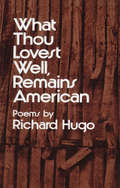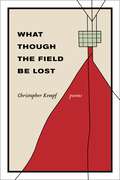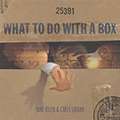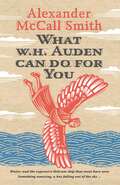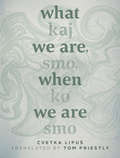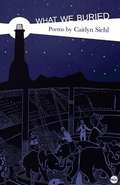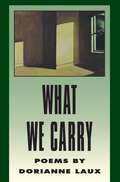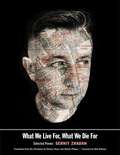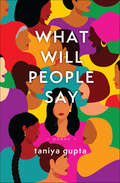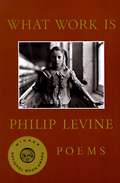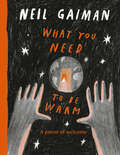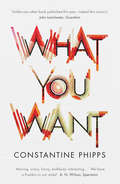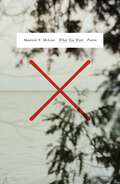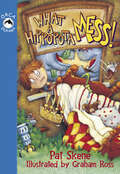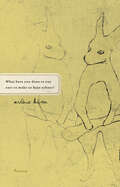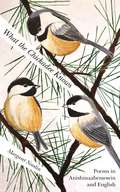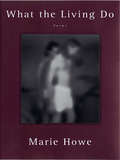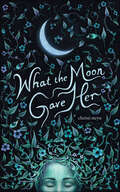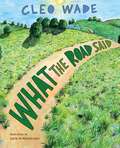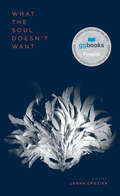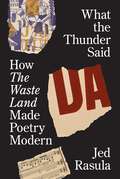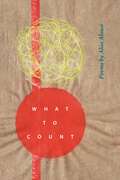- Table View
- List View
What Thou Lovest Well, Remains American
by Richard HugoHugo's most important subject is the American West; as William Stafford said of The Lady in Kicking Horse Reservoir, "A part of the West belongs to Hugo. By telling over and over again its places and people he reclaims it from the very bleakness he confronts; and it all begins to loom as a great intense abode that we can't neglect, that we can't bear to let go." In the present volume, people, places, dreams, memories are explored again-always in search of the poet's self. Hugo for many years directed the creative writing program at the University of Montana. He died in 1982.
What Thou Lovest Well, Remains American: Poems
by Richard HugoHere is a collection of poems by a writer whom the poet Carolyn Kizer calls "one of the most passionate, energetic, and honest poets living." Hugo's most important subject is the American West. In the present volume, people, places, dreams, and memories are explored again--always in search of the poet's self.
What Though the Field Be Lost: Poems
by Christopher KempfBased on two years living and researching in Gettysburg, Pennsylvania, What Though the Field Be Lost uses the battlefield there as a way to engage ongoing issues involving race, regional identity, and the ethics of memory.With empathy and humility, Kempf reveals the overlapping planes of historical past and public present, integrating archival material—language from monuments, soldiers' letters, eyewitness accounts of the battle—with reflection on present-day social and political unrest. Here monument protests, police shootings, and heated battle reenactments expose the ambivalences and evasions involved in the consolidation of national (and nationalist) identity. In What Though the Field Be Lost, Kempf shows that, though the Civil War may be over, the field at Gettysburg and all that it stands for remain sharply contested. Shuttling between past and present, the personal and the public, What Though the Field Be Lost examines the many pasts that inhere, now and forever, in the places we occupy.
What To Do With a Box
by Jane YolenIf you give a child a box, who can tell what will happen next? It may become a library or a boat. It could set the scene for a fairy tale or a wild expedition. The most wonderful thing is its seemingly endless capacity for magical adventure, a feature imaginatively captured in cardboardesque art by Chris Sheban and rhythmically celebrated in this poetic tribute by renowned children's author Jane Yolen.
What W. H. Auden Can Do for You (Writers on Writers #5)
by Alexander McCall SmithBestselling novelist Alexander McCall Smith's charming account of how the poet W. H. Auden has helped guide his life—and how he might guide yours, tooWhen facing a moral dilemma, Isabel Dalhousie—Edinburgh philosopher, amateur detective, and title character of a series of novels by best-selling author Alexander McCall Smith—often refers to the great twentieth-century poet W. H. Auden. This is no accident: McCall Smith has long been fascinated by Auden. Indeed, the novelist, best known for his No. 1 Ladies Detective Agency series, calls the poet not only the greatest literary discovery of his life but also the best of guides on how to live. In this book, McCall Smith has written a charming personal account about what Auden has done for him—and what he just might do for you.Part self-portrait, part literary appreciation, the book tells how McCall Smith first came across the poet's work in the 1970s, while teaching law in Belfast, a violently divided city where Auden's "September 1, 1939," a poem about the outbreak of World War II, strongly resonated. McCall Smith goes on to reveal how his life has related to and been inspired by other Auden poems ever since. For example, he describes how he has found an invaluable reflection on life's transience in "As I Walked Out One Evening," while "The More Loving One" has provided an instructive meditation on unrequited love. McCall Smith shows how Auden can speak to us throughout life, suggesting how, despite difficulties and change, we can celebrate understanding, acceptance, and love for others.An enchanting story about how art can help us live, this book will appeal to McCall Smith's fans and anyone curious about Auden.
What We Are When We Are: Kaj smo, ko sm (Mingling Voices)
by Tom Priestly Cvetka LipušWorking within a postmodern style, this rhythmic and melodious collection of poems originally written in Slovenian by Cvetka Lipuš and translated here by Tom Priestly, blends the real with the surreal, dull urban lives with dreams. Lipuš, known for the lexical beauty of her work, dwells on topics of time and space which she handles in an almost revolving, irreverent manner. Priestly captures the maze-like characteristic of her verse and carefully reconstructs the sonoric beauty of the work in its original language.
What We Buried
by Caitlyn SiehlThis book is a cemetery of truths buried alive. The light draws you in where you will find Caitlyn there digging. When you get close enough, she'll lean in and whisper, Baby, buried things will surface no matter what, get to them before they get to you first. Her unbounded love will propel you to pick up a shovel & help- even though the only thing you want to do is kiss her lips, kiss her hands, kiss every one of her stretch marks and the fire that is raging in pit of her stomach. She'll see your eyes made of devour and sadness, she'll hug you and say, Baby, if you eat me alive, I will cut my way out of your stomach. Don't let this be your funeral. Teach yourself to navigate the wound.
What We Carry
by Dorianne LauxFinalist, 1994 National Book Critics Circle Award for Poetry. Dorianne Laux's poetry is a poetry of risk; it goes to the very edge of extinction to find the hard facts that need to be sung. What We Carry includes poems of survival, poems of healing, poems of affirmation and poems of celebration.
What We Carry (American Poets Continuum #Vol. 28)
by Dorianne LauxFinalist, 1994 National Book Critics Circle Award for Poetry. Dorianne Laux's poetry is a poetry of risk; it goes to the very edge of extinction to find the hard facts that need to be sung. What We Carry includes poems of survival, poems of healing, poems of affirmation and poems of celebration.
What We Live For, What We Die For: Selected Poems (The Margellos World Republic Of Letters)
by Virlana Tkacz Wanda Phipps Bob Holman Serhiy ZhadanAn introduction to an original poetic voice from eastern Ukraine with deep roots in the unique cultural landscape of post-Soviet devastation "Everyone can find something, if they only look carefully," reads one of the memorable lines from this first collection of poems in English by the world‑renowned Ukrainian author Serhiy Zhadan. These robust and accessible narrative poems feature gutsy portraits of life on wartorn and poverty-ravaged streets, where children tally the number of local deaths, where mothers live with low expectations, and where romance lives like a remote memory. In the tradition of Tom Waits, Charles Bukowski, and William S. Burroughs, Zhadan creates a new poetics of loss, a daily crusade of testimonial, a final witness of abandoned lives in a claustrophobic universe where "every year there's less and less air." Yet despite the grimness of these portraits, Zhadan's poems are familiar and enchanting, lit by the magic of everyday detail, leaving readers with a sense of hope, knowing that the will of a people "will never let it be / like it was before."
What Will People Say: Poems
by Taniya GuptaWhat Will People Say follows a South Asian womanís journey through being a daughter, and later a daughter-in-law, within the strict confines of her patriarchal family. Readers watch as the narrator navigates life, trying to find a safe place for herself, until she finally becomes her own hero. Grappling with the subjects of sexual and psychological trauma, as well as mental health, this collection of poetry carves a path beyond the guilt of wondering: ìWhat will people say?î
What Work Is
by Philip Levine"This collection amounts to a hymn of praise for all the workers of America. These proletarian heroes, with names like Lonnie, Loo, Sweet Pea, and Packy, work the furnaces, forges, slag heaps, assembly lines, and loading docks at places with unglamorous names like Brass Craft or Feinberg and Breslin's First-Rate Plumbing and Plating. Only Studs Terkel's Working approaches the pathos and beauty of this book. But Levine's characters are also significant for their inner lives, not merely their jobs. They are unusually artistic, living 'at the borders of dreams.' One reads The Tempest 'slowly to himself'; another ponders a diagonal chalk line drawn by his teacher to suggest a triangle, the roof of a barn, or the mysterious separation of 'the dark from the dark.' What Work Is ranks as a major work by a major poet . . . very accessible and utterly American in tone and language." --Daniel L. Guillory, Library Journal<P><P> Winner of the National Book Award in 1991
What You Need to Be Warm
by Neil Gaiman Pam Smy Yuliya Gwilym Nadine Kaadan Daniel EgnéusDuring the coldest season, when the world feels scary—what do you remember about being warm? Baked potatoes. Trust. A kettle on the stove. Blankets. A smile. And, most of all, the reassurance that you belong. <p><p>In his powerful and moving poem, featuring illustrations from thirteen extraordinary artists, bestselling author and UNHCR Goodwill Ambassador Neil Gaiman draws together many different memories to answer the question, what do you need to be warm? <P><P><i>Advisory: Bookshare has learned that this book offers only partial accessibility. We have kept it in the collection because it is useful for some of our members. Benetech is actively working on projects to improve accessibility issues such as these.</i> <p> <b>New York Times Bestseller</b>
What You Want
by Constantine PhippsPatrick is still in love with his separated wife. Returning with their son after a trip to an amusement park, he begs, one last time, to reconcile with her. When she refuses, he is driven to thoughtless desperation: a bottle of sleeping pills, a bottle of whisky. And in his dying dream, he revisits that theme park of childish desire. There he finds the landscape - still garish and indulgent - has evolved. The attractions are religion, money and sex. The characters - costumed and acted - are transformed into Jefferson, Xunzi, Aristotle. And their purpose is to instruct Patrick in the pursuit of happiness throughout human history. But Patrick can only answer with his own story. He remembers falling in love with Louise. Recalls the enlightenment of their youth and the banality of their family life. He tells of their marriage, how it came under strain after the birth of his son; how he cheated; the unravelling of all his joy. Yet still his love persists. Beginning with the first line of Dante's Divine Comedy and taking in Disneyworld, the Declaration of Independence and the canon of philosophy in its stride, What You Want is a literary feat: a novel written entirely in verse, depicting life in all its ordinariness. It gives voice to a new Everyman and brings forth an unparallelled modern epic.
What You Want: Poems
by Maureen N. McLaneNational Book Award finalist Maureen N. McLane stuns with a precise, perceptive book of poetic meditations.In her first book of poems since the scintillating More Anon: Selected Poems, Maureen N. McLane offers a bravura, trenchant sounding out of inner and outer weathers. What You Want is a book of core landscapes, mindscapes, and shifting moods. Meditative, lyrical, alert to seasons and pressures on our shared life, McLane registers and shapes an ambient unease. Whether skying with John Constable or walking on wintry paths in our precarious republic, the poet channels what Wordsworth called “moods of my own mind” while she scans for our common horizon. Here are poems filled with gulls and harbors, blinking red lights and empty lobster traps, beach roses and rumored sharks, eels and crows, wind turbines and superhighways. From Sappho to the Luminist painter Fitz Henry Lane, from constellations to microplastics, What You Want is a book alive to the cosmos as well as to our moment, with its many vexations and intermittent illuminations. In poems of powerful command and delicate invitation, moving from swift notations to sustained sequences, this collection sees McLane testing what (if anything) might “outlast the coming heat.” And meanwhile, “There’s no end / to beauty and shit.”
What a Hippopota-Mess! (Orca Echoes)
by Pat Lamondin SkeneThe poems in this book tell stories of animals and nature. From two sweaty hippos, a smiling lizard and some creepy crawlers to a few tricky dandelions. At the end of each poem, find out more in an interview with a key character or a list of fascinating facts. The epub edition of this title is fully accessible.
What have you done to our ears to make us hear echoes?: Poems
by Arlene KimThis debut poetry collection blends fairy tales with Korean folklore as it examines the experience of immigration and identity. In her stunning debut poetry collection, What have you done to our ears to make us hear echoes?, Arlene Kim confronts the ways in which language mythologizes memory and thus exiles us from our own true histories. Juxtaposing formal choices and dreamlike details, Kim explores the entangled myths that accompany the experience of immigration—the abandoned country known only through stories, the new country into which the immigrant family must wander ever deeper, and the forked paths where these narratives meet and diverge. Sharing ground with Randall Jarrell&’s later poems, and drawing on a dizzying array of sources—including Grimm&’s Fairy Tales, Korean folklore, Turkish proverbs, Paul Celan, Anna Akhmatova, Antonin Dvorak&’s letters, and the numerous fictions we script across the inscrutabilities of the natural world—Kim reveals how a homesickness for the self is universal. It is this persistent and incurable longing that drives us as we make our way through the dark woods of our lives, following what might or might not be a trail of breadcrumbs, discovering, finally, that &“we are the only path.&”Winner of the 2012 American Book AwardPraise for What have you done to our ears to make us hear echoes? &“Using fairy tale archetypes like axes and keys, and diverse cultural references—from the Romanovs and code ciphers to Korean birth rituals—Arlene Kim recasts the experience of family immigration in language that manages to be both lush and restrained. This is a book to savor, give your friends, and let echo in your ears for a long time to come.&” —Katrina Vandenberg, author of Atlas &“In this young century, American writing has rapidly changed and the impact of this book proves Arlene Kim is a part of this exciting transformation. Her poetry and prose challenge the concept of genre as they redefine the role of the imagination.&” —Ray Gonzalez, author of Muy Macho
What if God Had Been Sleepy?
by Daniel PeroHave you ever wondered how our world might be, if God had been sleepy when He made you and me?This whimsical picture book about the seven days of Creation is a fanciful tale for God&’s littlest angels at bedtime or any time. Children will love the pictures and the rhymes. They can read along with mom or dad, or just relax and let their imagination run wild with the illustrations.Experience God&’s wonder and His love on every page. And know that once this fanciful week of Creation begins, the smiles will never stop.
What the Chickadee Knows (Great Lakes Books Series)
by Margaret NoodinMargaret Noodin explains in the preface of her new poetry collection, What the Chickadee Knows (Gijigijigaaneshiinh Gikendaan), "Whether we hear giji-giji-gaane-shii-shii or chick-a-dee-dee-dee depends on how we have been taught to listen. Our world is shaped by the sounds around us and the filter we use to turn thoughts into words. The lines and images here were conceived first in Anishinaabemowin and then in English. They are an attempt to hear and describe the world according to an Anishinaabe paradigm." The book is concerned with nature, history, tradition, and relationships, and these poems illuminate the vital place of the author’s tribe both in the past and within the contemporary world. What the Chickadee Knows is a gesture toward a future that includes Anishinaabemowin and other indigenous languages seeing growth and revitalization. This bilingual collection includes Anishinaabemowin and English, with the poems mirroring one another on facing pages. In the first part, "What We Notice" (E-Maaminonendamang), Noodin introduces a series of seasonal poems that invoke Anishinaabe science and philosophy. The second part, "History" (Gaa Ezhiwebag), offers nuanced contemporary views of Anishinaabe history. The poems build in urgency, from observations of the natural world and human connection to poems centered in powerful grief and remembrance for events spanning from the Sandy Lake Tragedy of 1850, which resulted in the deaths of more than four hundred Ojibwe people, to the Standing Rock water crisis of 2016, which resulted in the prosecution of Native protesters and, ultimately, the completion of the Dakota Access Pipeline on sacred land. The intent of What the Chickadee Knows is to create a record of the contemporary Anishinaabe worldview as it is situated between the traditions of the past and as it contributes to the innovation needed for survival into the future. Readers of poetry with an interest in world languages and indigenous voices will need this book.
What the Living Do: Poems
by Marie Howe"A deeply beautiful book, with the fierce galloping pace of a great novel."--Liz Rosenberg Boston Globe Informed by the death of a beloved brother, here are the stories of childhood, its thicket of sex and sorrow and joy, boys and girls growing into men and women, stories of a brother who in his dying could teach how to be most alive. What the Living Do reflects "a new form of confessional poetry, one shared to some degree by other women poets such as Sharon Olds and Jane Kenyon. Unlike the earlier confessional poetry of Plath, Lowell, Sexton et al., Howe's writing is not so much a moan or a shriek as a song. It is a genuinely feminine form . . . a poetry of intimacy, witness, honesty, and relation" (Boston Globe).
What the Moon Gave Her
by Christi SteynWhat the Moon Gave Her is a poetry collection born from self-discovery. The debut collection from Christi Steyn delves into themes of self-doubt, anxiety, and the unprecedented loss felt during the height of the pandemic. Beauty is found in every corner of this book's six dynamic chapters––"birth by the ocean", &“youplucked too many petals," &“how to grow wings,&” "dancing dolphins,&” "full moon/bloom" and "two trees intertwined"What the Moon Gave Her is a moving collection about rebirth and the way we reconnect with the world around us through love.
What the Road Said
by Cleo WadeWhat the Road Said is the New York Times-bestselling comforting and uplifting picture book from bestselling poet and activist Cleo Wade. Which way do I go? That is your choice to make, said the Road.But what if I go the wrong way?The Road curved a little, almost as if it was giving me a hug, and said,Do not worry. Sometimes we go the wrong way on our way to the right way.It's okay to be afraid or to sometimes wander down the wrong path. Bestselling poet and activist Cleo Wade's What the Road Said features illustrations by Lucie de Moyencourt and encourages us to lead with kindness and curiosity, remembering that the most important thing we can do in life is to keep going.
What the Soul Doesn't Want
by Lorna CrozierIn her newest collection, Lorna Crozier describes the passage of time in the way that only she can. Her arresting, edgy poems about aging and grief are surprising and invigorating: a defiant balm. At the same time, she revels in the quirkiness and whimsy of the natural world: the vision of a fly, the naming of an eggplant, and a woman who — not unhappily — finds that cockroaches are drawn to her. “God draws a life. And then rubs it out / with the eraser on his pencil.” Lorna Crozier draws a world in What the Soul Doesn’t Want, and then beckons us in. Crozier’s signature wit and striking imagery are on display as she stretches her wings and reminds us that we haven’t yet seen all that she can do.
What the Thunder Said: How The Waste Land Made Poetry Modern
by Jed RasulaOn the 100th anniversary of T. S. Eliot’s modernist masterpiece, a rich cultural history of The Waste Land’s creation, explosive impact, and enduring influenceWhen T. S. Eliot published The Waste Land in 1922, it put the thirty-four-year-old author on a path to worldwide fame and the Nobel Prize. “But,” as Jed Rasula writes, “The Waste Land is not only a poem: it names an event, like a tornado or an earthquake. Its publication was a watershed, marking a before and after. It was a poem that unequivocally declared that the ancient art of poetry had become modern.” In What the Thunder Said, Rasula tells the story of how The Waste Land changed poetry forever and how this cultural bombshell served as a harbinger of modernist revolution in all the arts, from abstraction in visual art to atonality in music.From its famous opening, “April is the cruellest month, breeding / Lilacs out of the dead land,” to its closing Sanskrit mantra, “Shantih shantih shantih,” The Waste Land combined singular imagery, experimental technique, and dense allusions, boldly fulfilling Ezra Pound’s injunction to “make it new.” What the Thunder Said traces the origins, reception, and enduring influence of the poem, from its roots in Wagnerism and French Symbolism to the way its strangely beguiling music continues to inspire readers. Along the way, we learn about Eliot’s storied circle, including Wyndham Lewis, Virginia Woolf, and Bertrand Russell, and about poets like Mina Loy and Marianne Moore, whose innovations have proven as consequential as those of the “men of 1914.”Filled with fresh insights and unfamiliar anecdotes, What the Thunder Said recovers the explosive force of the twentieth century’s most influential poem.
What to Count (Made in Michigan Writers Series)
by Alise AlousiWith heart and insight, the poems in Alise Alousi’s What to Count speak to what it means to come of age as an Iraqi American during the first Gulf War and its continuing aftermath, but also to the joy and complexity of motherhood, daughterhood, and what it means to live a creative life. More than a description of the world, Alousi’s poetry actively lives in and of the world. These poems explore the nuances of memory through the changes wrought by time, conflict, and distance. In "The Ocularist" and "Art," and others, Alousi’s extraordinary verbal deftness precisely locates the still-tender pains and triumphs of collective being while trying to be an individual in the world. What to Count is a remarkable collection of contemporary poetry—both a lyrical splendor and a contemplative account of lineage, silenced history, and identity.

